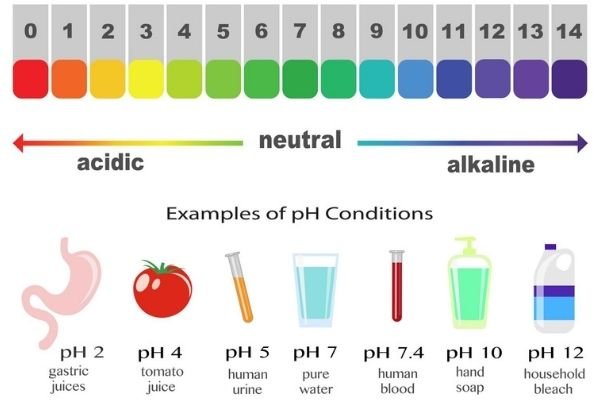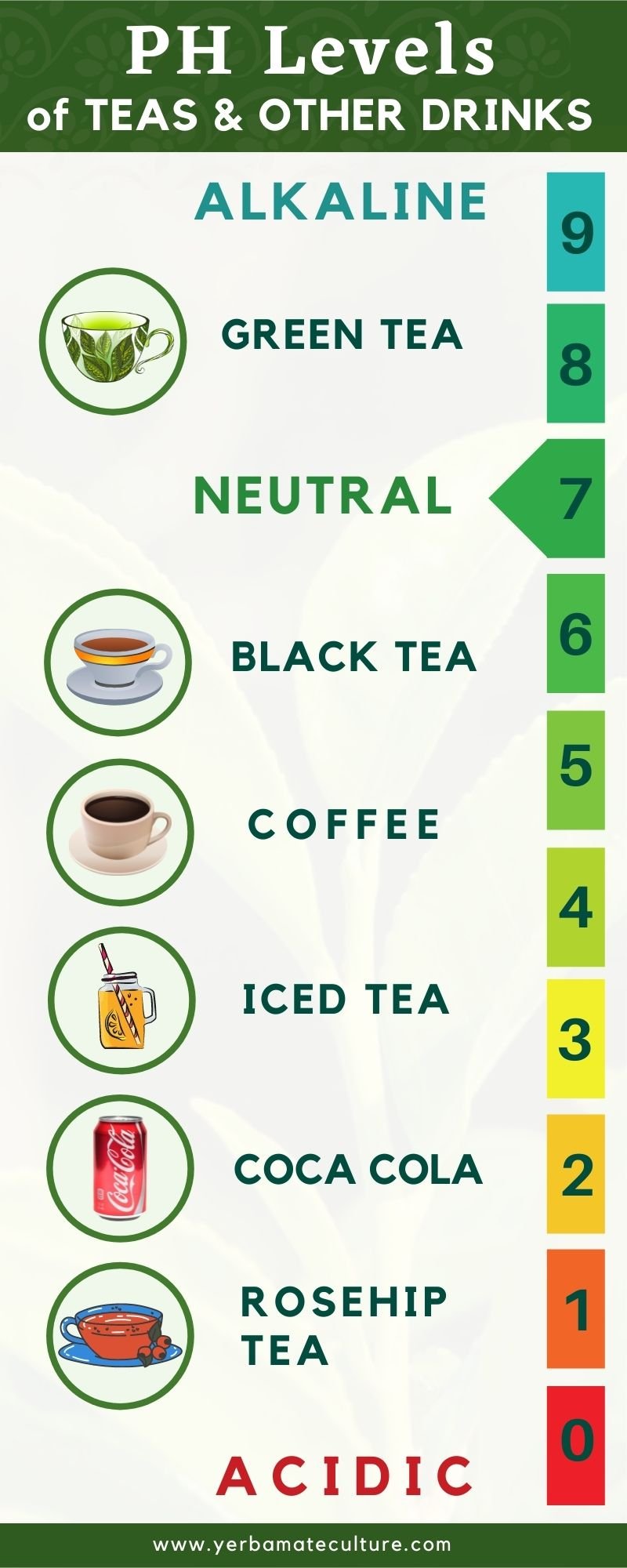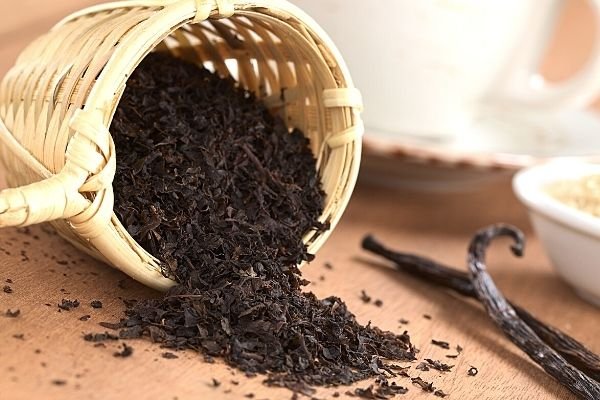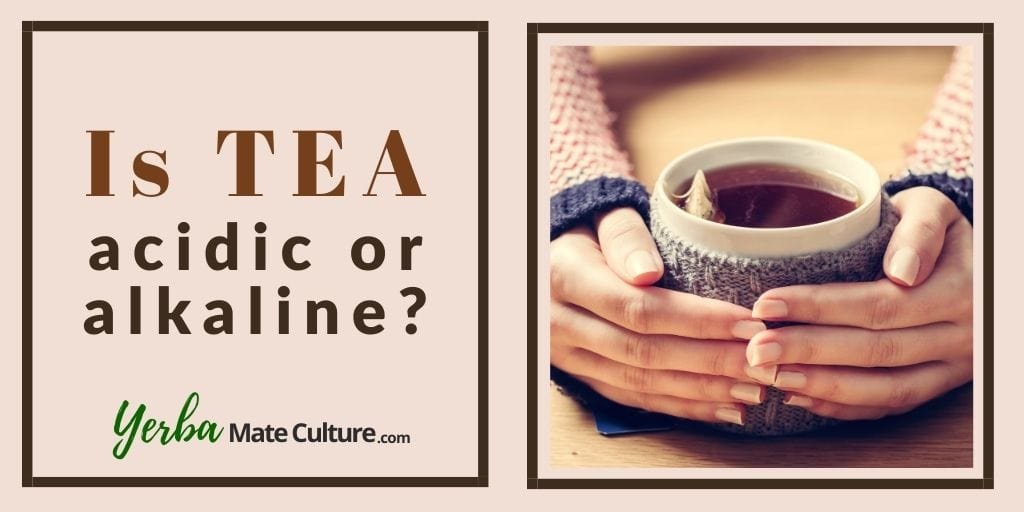Tea time is synonymous with flavor, relaxation, and good health. Research shows that the antioxidants found in teas help to neutralize free radicals linked with aging and disease.
Many teas are also associated with benefits like faster wound healing and stable blood pressure. So it’s easy to see why tea is considered a “super drink” for health in so many circles.
Yet, people who are suffering from acid reflux or follow specific diets might have questions about the acidity of tea.
This question could also be on your mind if you’re worried about how regular tea drinking affects teeth.
So is tea acidic or alkaline?
It’s time to get steeped in the facts about tea acidity!
Is Tea Basic (Alkaline) or Acidic?
The PH Scale
First, it helps to know what it means when we say that a food is acidic.
The pH scale of 0 to 14 is used to measure levels of acidity and alkalinity. Foods with higher levels of hydrogen ions are considered to have higher acidity.
Foods are categorized as being acidic when they have pH levels lower than 7, while ones with pH levels higher than 7 are considered alkaline. A pH level of 7 is considered neutral.

When food is processed by the body, it leaves behind a metabolic waste that can be alkaline, neutral, or acidic. People who follow alkaline diets believe that eating non-acidic foods helps to reduce acidity in the blood for protection against illness and disease.
They strive to make their blood more alkaline because they believe that this offers protection against illness and disease.
Is Tea Acidic?
There is no simple answer to this question because there are many different types of teas.
In short, most teas are slightly acidic, while green tea is an exception as it is alkaline.
Before we go into more detail, below is an infographic that will give you a quick overview of the average pH levels of some of the most popular teas and other drinks:

Save on Pinterest:
Next, let’s take a closer look at the acidity of different teas:
Green and White Tea
Green and white teas usually have a pH value somewhere around 8 or 9, which means they are not acidic but actually slightly alkaline.
This is mainly because these teas are brewed with unoxidized tea leaves.
If you want to try green tea that is refreshing and has a pleasant and mild taste, check out this review of Kirkland Matcha Green Tea.
Yerba Mate, Chamomile, Mint, and Fennel Tea
These herbal teas are very close to pH 7, which means they are neutral. This was confirmed by a Brazilian study from 2014.
Note that yerba mate has high caffeine content, while chamomile, mint, and fennel are naturally caffeine-free.
Black Tea
Made with fully oxidized tea leaves, black tea is slightly acidic and typically has a pH value between 5 and 5.5. The oxidation process increases the acidity of the tea leaves.

Iced Tea and Sweet Tea
These types of beverages are usually made with brewed black tea and flavored with lemon or sometimes with other fruits or berries.
In addition to the black tea, the fruits and berries make them more acidic and they can have pH values as low as 3 or 2.
Want to make some non-acidic iced tea at home?
Use one of our recommended iced tea makers and choose your own ingredients to make healthy and refreshing iced tea that is not acidic.
Rosehip and Blackberry Tea
These are some of the most acidic herbal teas and often have a pH level of about 2.
What Affects the Acidity of Tea?
Here are some of the most important factors that affect the acidity of your tea:
Growing Conditions: Teas grown around the world in acidic soil will have higher acidity than teas grown in non-acidic soil.
How You Brew It: Steeping black tea or other acidic tea for longer creates a stronger and more acidic brew.
Water Ratio & Temperature: Using hotter water or having a higher ratio of leaves to water creates stronger tea that is more acidic or alkaline (depending on the type of tea).
Loose or Bagged Tea: The broken and crushed leaves used in most tea bags will release more acidity. By contrast, the intact leaves and buds in loose tea will release less acidity.
One important thing to remember is to use a non-toxic electric kettle made with food-safe materials for heating the water. Of course, you can also use traditional stainless steel or cast iron stovetop kettle as well.
What Problems Can Acidic Drinks Cause?
Tea and coffee lovers might wonder if enjoying the beverages they love can cause any health issues.
While both coffee and tea are generally considered to be healthy beverages due to the wide range of benefits offered by their rich antioxidants, these drinks could pose problems for people with some specific health concerns.
In general, when comparing tea vs coffee acidity, coffee is more acidic than most teas. Coffee also seems to be harsher on our stomachs and teeth.
Acid Reflux (GERD) and Heartburn
The most common reason why some people stay away from acidic drinks is acid reflux.
People with a condition called gastroesophageal reflux disease (GERD) may find that coffee, tea, and other caffeinated beverages make the symptoms worse.
Acidic and caffeinated beverages are known to sometimes irritate the esophagus. These beverages can also potentially weaken something called the lower esophageal sphincter (LES) to cause a backward flow of stomach content.
In addition to being painful and uncomfortable, reflux can also increase the risk for esophageal cancer.
“Alcoholic beverages (wines and beer), coffee, and (to a lesser extent) tea were associated with significant amounts of reported heartburn when compared with water,” according to a study on the acidity of popular beverages. This same study found that milk could also potentially cause heartburn irritation.
This means that acidic beverages can exacerbate acid reflux issues. I know this painfully well from my own experience since I have suffered from this condition for years.
Luckily, I am now able to manage it. Some of the key things included lessening coffee consumption and starting to drink more herbal teas. I have also put together an article with my best tips and recommended teas for treating acid reflux naturally.
Popular herbal teas like ginger, licorice, and marshmallow root teas as well as chamomile and slippery elm are all known to aid in healthy digestion. Some tea brands actually offer special digestion-support formulas that allow people to enjoy hot tea that helps to soothe heartburn and indigestion.
However, not all herbal tea is necessarily heartburn-safe tea. Some herbal teas like peppermint and spearmint tea can be aggravating for people who experience heartburn.
Teeth Damage
Teas can also be harmful to teeth.
Acidic teas and other acidic drinks like fruit juices and sodas can slowly erode the protective enamel on teeth.
However, tea’s impact on teeth doesn’t necessarily come down just to acidity. Tea also contains substances known as tannins that can be harmful as well.
Tannins are naturally occurring substances that are found in many different plants. They provide many health benefits like speeding up wound healing, helping blood to clot, and stabilizing blood pressure.
Unfortunately, tannins can also make it easier for stains to stick to teeth.
It’s important to keep the right perspective when looking at the impact of tea drinking on teeth. While tea can result in some enamel loss or staining over time, it’s not the worst thing a person can drink as far as oral health.
In a study from 2008, researchers actually found that the erosive effects of green and black tea were no different from water.
That means that green tea and black tea were found to essentially have no erosive effects.
The same study showed that drinking brewed teas resulted in dramatically less enamel loss than drinking soft drinks and acidic juices.

However, this is just one study and the possible negative impact of tea on teeth still needs to be studied further.
People who are concerned about enamel loss and staining do have ways to control just how rich their brews are. There are also teas that don’t stain teeth.
Steeping tea for a shorter time can help to prevent the darker coloring that can stain teeth. Many dentists also recommend rinsing the mouth with water after drinking tea. This can help remove residue from coffee or tea and prevent staining.
Tea PH Level FAQ
Is black tea acidic?
Yes, black tea is slightly acidic. It’s brewed with fully oxidized tea leaves and usually has a pH value between 5 and 5.5 but it can be even more acidic if you make it strong.
Is green tea acidic?
No, green tea is alkaline as it is made with largely unoxidized tea leaves. Green and white teas usually have a pH value somewhere around 8 or 9, which means they are not acidic but actually slightly alkaline.
Is oolong tea acidic?
Oolong tea typically has a pH level of about 6 so it’s slightly acidic.
Is white tea acidic?
No, same as green tea, white tea is made with unoxidized tea leaves and it is slightly alkaline.
Are herbal teas acidic?
The acidity levels in herbal teas are determined by the ingredients used to make them — which can basically be any herbs, spices, and pieces of dried fruits and berries.
Popular herbal teas like fennel, mint, and chamomile tea are actually very close to being neutral on the acid-alkaline scale. Most rank between 6.5 and 7 on the pH scale.
Herbal teas with fruits and berries can be more acidic. For instance, both rosehip tea and blackberry tea are at around 2 to 3 on the pH scale.
Is sweet tea acidic?
Yes, sweet tea is often quite acidic and may have a pH level of 2 or 3. This is especially due to the fact it’s commonly flavored with lemon.
Is iced tea acidic?
Yes, same as sweet tea it’s often flavored with lemon or other fruits and berries that make it acidic.
Is yerba mate acidic or alkaline?
Yerba mate pH level is usually very close to 7, which means it’s not acidic but very close to neutral. Some yerba mate teas can even be slightly alkaline.
Final Thoughts on the Acidity of Tea
Many brewed teas have mild acidity. While a person who is avoiding any acidic foods or beverages in their diets may choose to stay away from brewed beverages, most people don’t necessarily need to worry about these nearly negligible levels.
People who suffer from heartburn related to the consumption of teas with moderate to high acidity levels do have some options for still enjoying a warm cup of comfort.
In fact, some herbal teas are actually known to reduce heartburn and digestive irritation.
What’s more, the health benefits from the antioxidants and tannins found in teas often outweigh any concerns about acidity levels for most people striving to enjoy balanced nutrition.
The final thing to remember is that not all herbal teas are ideal for people suffering from reflux issues just because they are decaffeinated. Stick to soothing options like ginger or chamomile if you’re using tea for a tummy rescue!





